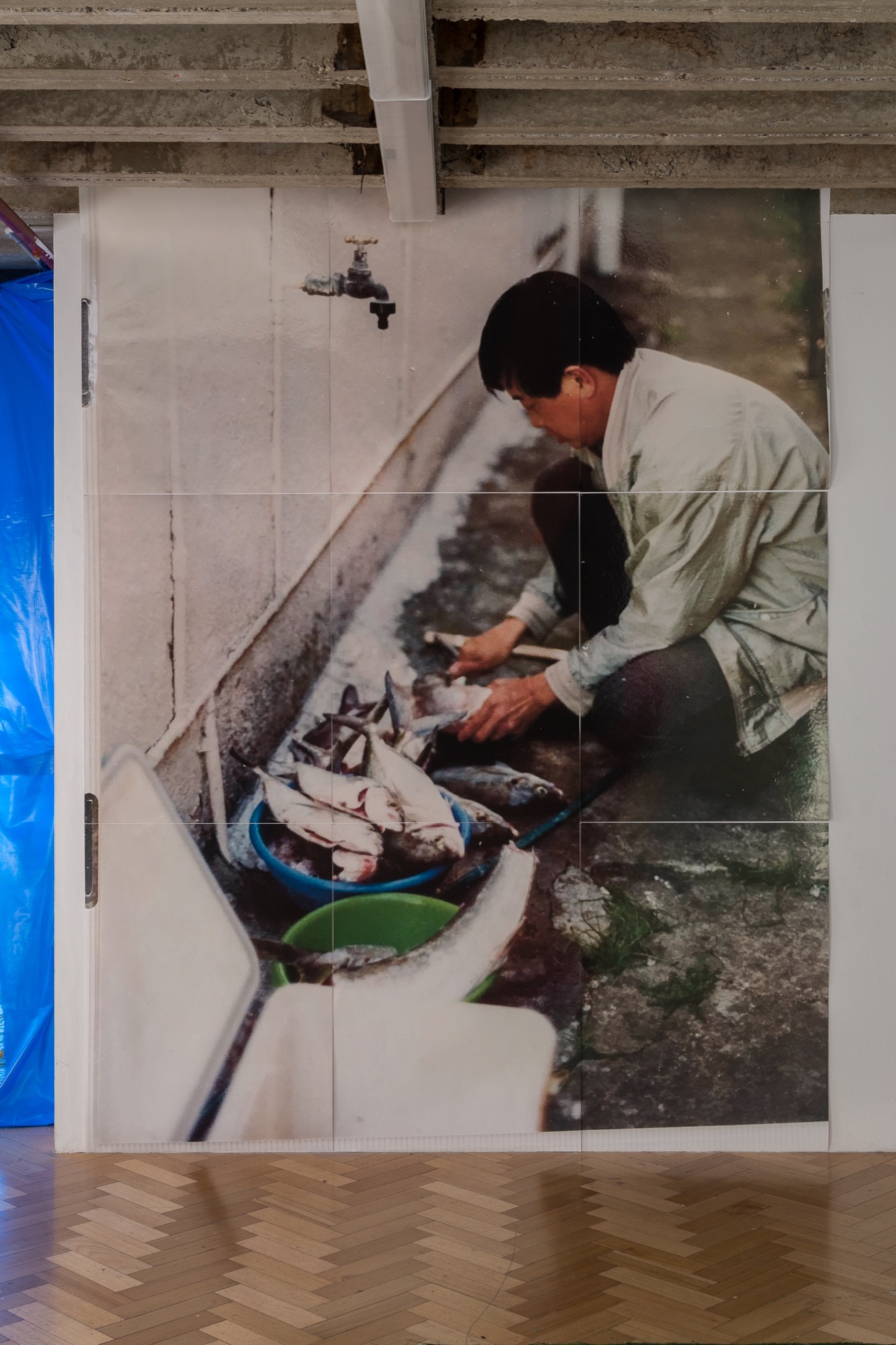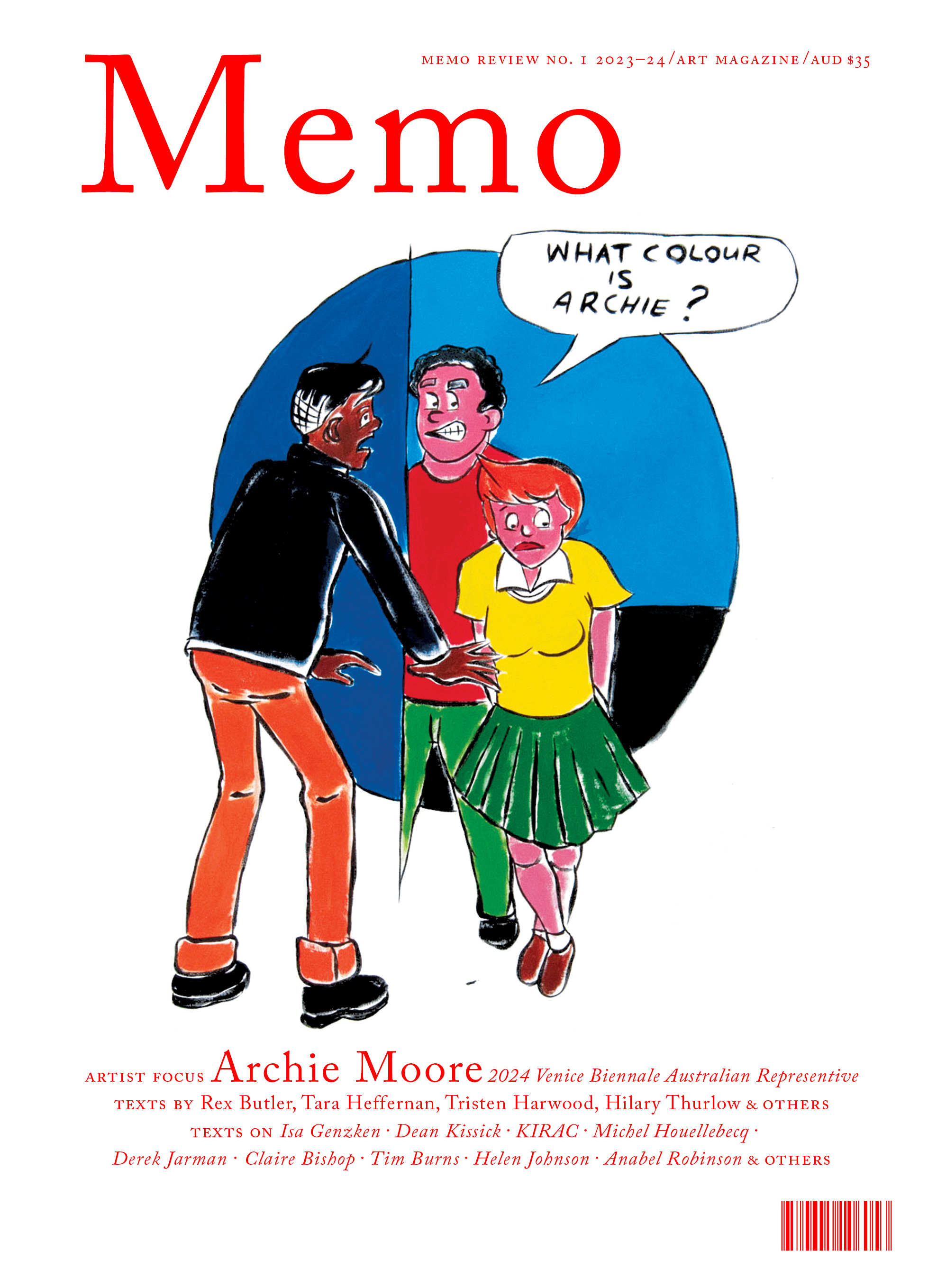
Jason Phu’s My Parents Met at the Fish Market is the latest in Westspace’s series of solo commissions, in which all four galleries are given over to one artist. While he is younger and less experienced than previously commissioned artists, Phu is clearly up to the task of filling the space. His irrepressible style is immediately manifested in the fact that to enter the exhibition’s second room viewers must bend double and shuttle awkwardly through a tunnel made in the shape of an enormous fish. Like a ludicrously overblown school project or a remnant of a low-budget parade float, this chicken wire and crushed velvet monstrosity clearly signals that Phu is not averse to a bit of silliness. However, the fact that there is more going on in Phu’s work than simple levity makes this a show worth visiting. Upon entering the belly of the beast, the exhibition moves sequentially through several increasingly immersive environments. While Phu’s aesthetic approach is reminiscent of the ‘slacker’ art of the 1990s, his deployment of this style and his choice of materials is sophisticated.

In a practice that draws heavily from his own experiences as an Australian of Chinese and Vietnamese heritage and from the eccentric juxtapositions and mistranslations that characterise diasporic culture, Phu approaches cultural slippages with warmth and idiosyncratic humour. He has often used the traditional Chinese arts of printmaking and calligraphy, for example, but in a way that smacks of Aussie larrikinism. The opening space in My Parents Met at the Fish Market is a case in point. The Chinese characters covering one wall of Westspace’s front gallery communicate Phu’s father’s recipe for steamed fish to those viewers who can read Mandarin. The wall painting opposite reads like a shrine to an anarchic god of death and cookery. A dancing four-headed skeleton, accompanied by a wilting bunch of spring onions and a bottle of Lee Kum Kee Seasoned Soy Sauce for Seafood, guts fish with his three arms while pissing on a small potted chilli plant positioned on the floor nearby. This, like much in the exhibition, is an autobiographical reference. Phu revealed in the show’s short accompanying text that his father used to tend to his backyard chilli plant by pissing on it and feeding it fish guts.
In fact, the exhibition in total could be read as autobiography, or perhaps self portraiture. Beginning with his parents’ meeting – as the exhibition title asserts – at the fish market (in text scrawled across the gallery entrance, Phu imagines the goofy pick-up line his Dad might have used: “Did you just fall from heaven? Because you look like an angelfish”), each room apparently takes viewers deeper into the artist’s psyche. Having passed through the body of the giant fish (or birth canal?) into the exhibition’s second room, Phu confronts his viewers with another giant body. An enormous Buddha made of Epoch Times newspapers reclines on a lawn of astroturf underneath wall-projected family snaps of the artist and his parents.

Canberra Times reviewer Peter Haynes recently described Phu’s work as “neo-grunge Dadaist expressionism.” Anachronistic art-historical mashups aside, Haynes is correct that it is in the mix of disarmingly intimate biographical detail, an irreverent take on traditional mythologies and a casual approach to execution that Phu’s work is forged. His serene Buddha, for example, is accompanied by a band of crudely made, unruly demon figures clutching musical instruments, and also by some utterly endearing photographs of his mother. Smiling happily at the camera, she stands with her full airport luggage trolley under the sign “Sydney welcomes you to Australia,” and then again, this time in some über-90s knitwear and accompanied by her young son, in the sunshine outside the (presumably titular) fish market.
Commentary on Phu’s work has tended thus far to focus on its humour and its multicultural subject matter. For me, the strongest aspect of his exhibition at Westspace is his ability to convey complex emotion through the selection and assembly of material. Like the 1990s work of other local artist-comedians such as Kathy Temin, Ronnie van Hout and Mikala Dwyer, Phu’s slapdash art succeeds because it is underpinned by a precise comprehension of the emotional nuance of found materials. All of these artists, like all good humourists , know how to combine the poignant and the lighthearted.

In Westspace’s ‘back space’ gallery, Phu proves himself adept with the Surrealist dreamscape in what is easily the strongest room in the show. My original viewing notes read: “Plastic-lined murder room meets under-the-sea themed primary school disco. Smell of soy sauce.” The hauntingly melancholic strains of Erik Satie’s Gymnopédie No. 1 mingle with the sound of waves and seagulls in an installation that flickers between nostalgia and creepiness. Blue tarpaulins sagging from the walls and ceiling, and yellow plastic sheeting on the floor combine with plastic crayfish and a soft-toy whale to create a kitschy indoor ‘beach’ experience. An oscillating fan provides a gentle breeze across a white plastic table setting for three, complete with a bottle of Coke and soy sauce residue on the plastic plates. The table is centred under an ominously low-hanging ceiling light which to me (too many TV crime dramas?) registers as ‘interrogation room.’ Overhead, a length of flex ducting painted orange resembles a shonky Chinese dragon twisting through the blue tarpaulin sky. The beach habitat of white Australian cultural identity becomes, in Phu’s hands, a disquieting stage set of inadequate representations and uncanny resemblances that is freighted with emotion.

Issue No. 1
Grab a copy of Memo’s first glossy annual magazine issue, featuring an extended artist focus on Archie Moore, the 2024 Venice Biennale Australian Representative, with essays by Rex Butler, Tara Heffernan, Tristen Harwood, and Hilary Thurlow.
Issue 1 features articles by Audrey Schmidt, Philip Brophy, Helen Hughes, The Manhattan Art Review’s Sean Tatol, Cameron Hurst, Chelsea Hopper, among your favourite regular Memo contributors. There are reviews and articles, including on Melbourne design art, French literature’s ageing enfant terrible, Michel Houellebecq, Derek Jarman’s Blue (1993), the celebrated Spike magazine cultural critic, Dean Kissick, the local cult-favourite Jas H. Duke, and much, much more.
Memo Magazine, 256 pages, 16 x 25 cm

Further increasing the emotional intensity, the final room of Phu’s exhibition is genuinely frightening – which is not something easy to achieve. A local curator at the exhibition opening (who will remain nameless) refused point-blank even to go in. Using only swathes of black builder’s plastic, Phu has managed to create an environment that is straight out of my nightmares. Here, it seems, we have entered the deep dark subconscious of the irreverent prankster who was introduced in the exhibition’s first room. Or is this overly psychoanalytic? Another thread in Phu’s show would seem to warn against taking things at face value, or presuming that translations are accurate. Fish are a recurring theme in the exhibition, and as Westspace’s staff helpfully informed me, fish are a symbol of prosperity in China. This is in part because in Mandarin the two words – fish and prosperity – are homophones. They sound alike when spoken, but do not look alike when written down. In Phu’s beach-themed installation in the back gallery, he has written the characters for ‘fish’ and ‘prosperity’ in large, splashy white strokes on the blue plastic walls. The play on similarity and difference in these words is echoed by the soy sauce and Coke on the table: two visually similar brown liquids that are also emblematic of ‘Eastern’ and ‘Western’ food, a shorthand for cultural difference. The mobility of meaning in cross-cultural communication really comes to the fore in diasporic communities. Some aspects of a given cultural tradition are inevitably suppressed in the process of translation, while others take on unexpected new associations. Phu exploits the flexibility of this space of slippage and intersection, with both humour and candour.
Anna Parlane is a writer and occasional curator based in Melbourne. She is currently finishing a PhD at Melbourne University, and was previously assistant curator at Auckland Art Gallery Toi o Tāmaki.
Title image: Jason Phu, My Parents Met at the Fish Market, 2017. Installation image, Westspace. Photo credit: Christo Crocker.)